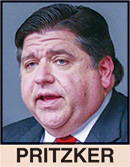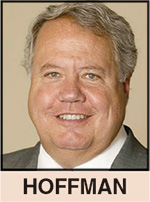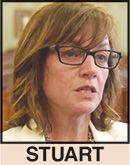Springfield, IL – Illinois legislators last week approved a plan to consolidate hundreds of municipal pension programs for police and fire fighters to cut administrative costs and firm up the pensions.
State Rep. Jay Hoffman (D-Swansea) sponsored the bill that would turn about 650 individual plans into two statewide funds, one called the Police Officers’ Pension Investment Fund and the other the Firefighters’ Pension Investment Fund.
The House approved the bill 96-14 after some last-minute amendments by Hoffman, and the Senate approved it 42-12. The votes were bipartisan, but Republicans overwhelmingly opposed the measure.
 Gov. J.B. Pritzker said the bill would relieve pressure on overburdened pension accounts outside of Cook County by combining some $15 billion in assets and increasing investment returns by $800 million over five years, totaling $2.5 billion.
Gov. J.B. Pritzker said the bill would relieve pressure on overburdened pension accounts outside of Cook County by combining some $15 billion in assets and increasing investment returns by $800 million over five years, totaling $2.5 billion.
“We have put hundreds of cities in Illinois on a path toward alleviating their massive property tax burden,” Pritzker said. It shows that Illinois “can tackle its most intractable problems,” he added.
MEETING THE NEEDS OF MUNICIPALITIES AND EMPLOYEES
Hoffman said it meets the needs of both the municipalities and their employees.
 “If you’re a mayor, you want to make sure that your property taxes are kept at a minimum; you want to make sure that your pension funds are adequately funded,” he said. “If you’re an individual who is working and paying into the system, you want to make sure that those retirement funds are solvent. This bill meets all those goals.”
“If you’re a mayor, you want to make sure that your property taxes are kept at a minimum; you want to make sure that your pension funds are adequately funded,” he said. “If you’re an individual who is working and paying into the system, you want to make sure that those retirement funds are solvent. This bill meets all those goals.”
The bill does not address large funding gaps in the state’s largest pension programs – nine in Chicago and Cook County that now lack $44 billion, and six statewide funds short more than $130 billion.
The bill does improve benefits to some newer employees who have been on a Tier 2 pension program, created to save money. The funds will still be controlled by municipalities, not the state, Hoffman said, to keep the government from pulling money from retirement accounts for other purposes. If municipalities choose to withhold the required annual funding, the state comptroller could withhold other state money coming to the cities.
A representative from Peoria illustrated the problem by noting that the city cannot fill 21 police vacancies and 15 fire fighter jobs because pension costs are too high.
“As we debate the merits of consolidation of pension funds, we’re seeing in our communities a different type of consolidation taking place,” Rep. Ryan Spain (R-Peoria) said.
Illinois lawmakers approve capping insulin costs
The Illinois Legislature last week also approved capping co-payments for insulin at $100 a month for all patients, however much they need. The cap applies to commercial insurance plans regulated by the state.
The bill, sponsored by Sen. Andy Manar (D-Bunker Hill), will require the state to issue an insulin pricing report detailing findings on insulin pricing practices and recommendations to control and prevent overpricing.
The price of insulin has drastically increased in the U.S. in recent years. A 2016 analysis showed the price tripled between 2002 and 2013.
Some 1.3 million Illinoisans are living with diabetes and rely on insulin to manage their blood sugar levels. Price increases – upwards of $1,400 a month under some plans – have left many struggling to pay for their needed medication and at risk of deadly consequences as one in four ration their doses.
 “Thanks to countless grassroots advocates and the brave individuals who stepped up and shared their testimonies, the Illinois General Assembly just sent a clear message that our state will no longer allow pharmaceutical companies to take advantage of Illinoisans living with diabetes by charging exorbitant prices for lifesaving insulin medication,” Manar said.
“Thanks to countless grassroots advocates and the brave individuals who stepped up and shared their testimonies, the Illinois General Assembly just sent a clear message that our state will no longer allow pharmaceutical companies to take advantage of Illinoisans living with diabetes by charging exorbitant prices for lifesaving insulin medication,” Manar said.
Illinois is the second state in the country to cap insulin costs.
 Rep. Katie Stuart (D-Edwardsville) was among those who supported the bill.
Rep. Katie Stuart (D-Edwardsville) was among those who supported the bill.
“For someone living with diabetes, insulin is not optional, and the $100 cap will give diabetics back some control over their health and their future,” Stuart said. “Families should not have to choose between paying for their groceries or their life-saving insulin.”

